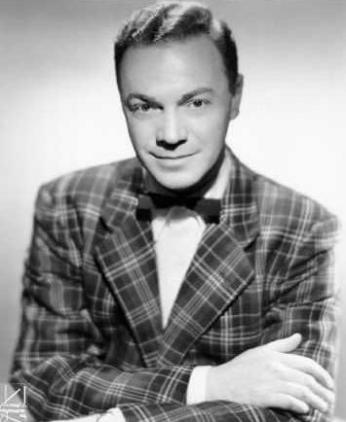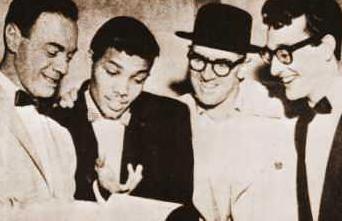ALAN FREED R.I.P. ROCK N PERPETUITY
March 10, 2007

In the past few months we’ve heard about millions of dollars being paid out by the giant music conglomerates, as a settlement for using payola to get their product played. The first time the public became aware of the practice was forty years ago, during the cold war, when endless repetition of popular music on the radio was the ONLY way to sell records!
Critics of Rock and Roll, equated the saturation of the public consciousness with this subversive music to “brainwashing” and many politicians saw this “pay for play” scandal as a way to stop the music in it’s tracks. What better way to accomplish this, than to crucify the man who was responsible for many of the hit artists of the day and the record companies who spawned them…The man who named Rock and Roll, Alan Freed.
The following is from the history of rock…
“Payola” is a contraction of the words “pay” and”Victrola” (LP record player), and entered the English language via the record business. The first court case involving payola was in 1960. On May 9, Alan Freed was indicted for accepting $2,500 which he claimed was a token of gratitude and did not affect airplay. e passed away in Palm Springs
Before Alan Freed’s indictment, payola was not illegal, however, but commercial bribery was. After the trial, the anti-payola statute was passed under which payola became a misdemeanor, penalty by up to $10,000 in fines and one year in prison.
By the mid- fifties the independent record companies had broken the majors stranglehold on airplay and BMI licensed songs dominated the charts. In the wake of the quiz show scandals ASCAP (American Society of Composers, Authors and Publishers) urged House Oversight Subcommittee Chairman Oren Harris to look into the recording industry’s practice of payola.
ASCAP, with its head in the sand, believed BMI licensed songs were hits only because of payola. With the breakdown in morals, ASCAP believed these records were played so often by greedy deejays causing them to become imprinted on unsuspecting teenagers. ASCAP who had always looked at rock and roll as a passing fad. With these hearings they were trying to ensure that would be the case.
“The cancer of payola cannot be pinned on rock and roll.” ….Billboard Magazine. Billboard stated payola was rampant during vaudeville of the 20s, and the big band era of the 1930s and 1940s
The committee decided to look into deejays who took gifts from record companies in return for playing their records on their shows. Fearing the worse the record companies began stepping forward and announcing that they had given money to specific deejays. Soon twenty five deejays and program directors were caught in the scandal. Among the more popular ones were Joe Niagara (WIBG, Philadelphia), Tom Clay (WJBK, Detroit), Murray “The K” Kaufman (WINS, New York) and Stan Richards (WILD, Boston) The probe quickly focused in on the two top deejays in the country Dick Clark and Alan Freed’s broadcast alliances quickly deserted him. In late November, Freed was fired from both ABC-radio and WNEW-TV.
Clark, with more to lose, quickly gave up all his musical interests when ordered to do so by ABC-TV. When asked to sign a statement denying involvement Freed refuse and was promptly fired from his job with WINS.
When Clark appeared to testify he brought Bernard Goldsmith a statistician. Goldsmith told the committee that Clark had a 27% interest in records played in the past 28 months and those records had a 23% popularity rating. The committee was stunned as they wondered what came first the chicken or the egg.
Clark’s testimony began with telling the committee he had given up all outside interests connected with the recording industry. He also said the only reason he had gotten involved with those businesses were for the tax advantages. Clark admitted a $125 investment in Jaime records returned a profit of $11,900 and of the 163 songs he had rights to, 143 were given to him.
When questioned about Jamie records it was discovered that Jamie paid out $15,000 in payola, but Clark denied ever accepting any. The committee clearly didn’t believe Clark, but he received just a slap on the wrist. In fact, committee chairman Oren Harris called Clark “a fine young man.”
Freed who refused to deny involvement wasn’t so lucky. Though he would only receive a small fine and six months suspended sentence his career was in tatters. Freed would die penniless, a bitter broken man, Jan 20, 1965 in Palm Springs, California.. He was forty three.

Alan Freed, Larry Williams, some guy in a hat and Buddy Holly
I first met Alan Freed in 1959, at one his legendary Rock and Roll Shows at the Brooklyn Paramount. I wanted to become a rock star…and Alan wanted to manage me. I spent a lot of time backstage with he and his”family”, which included Jackie Wilson, Jimmy Clanton, The Isley Brothers, Fats Domino, Bobby Darin, the Skyliners, Little Anthony and the Imperials.
While basking in their reflected glory, I thought back to when I started High School, and really had to search the radio for my kind of music. Alan Freed, was always the first one I’d turn to when I wanted to hear Bill Haley and the Comets, The Platters, Frankie Lyman and the Teenagers, Chuck Berry, Fats Domino, or Elvis Presley!
As Rock and Roll became more and more popular, so did Alan Freed. He gave us all a steady diet of what we wanted to hear. I heard the word “Payola” from time to time, but it never meant much to me. Growing up in the Bronx, I accepted the fact that you did whatever you had to do to gain the edge! I thought, ” What’s the big deal about paying to have a record played anyway?”
In the early 60’s, when I was primarily a songwriter and producer, I was concerned with making quality commercial records and would only lease my product to companies who could give me the kind of radio exposure needed to make a hit! I never asked them how they did it …and they never told me! I always believed what you don’t know, won’t get you indicted!
Whatever Alan Freed did or didn’t do, he should be primarily remembered as one of the first Champions of Rock and Roll, a man who for the love of the music, was responsible for dozens of sucessful careers in the spotlight as well as dozens of those behind the scenes of the music business.
Thank you for befriending me and validating me in a way that nobody else could!
Alan Freed, R.I.P. Rock In Perpetuity!
Respectfully, Artie Wayne
THANKS TO EVERYONE WHO IS BUYING MY BOOK…I PROMISE TO USE EVERY PENNY I MAKE ON IT TO STAY ALIVE AND WELL!

NOW YOU CAN BUY THE ARTIE WAYNE BOOK ,“I DID IT FOR A SONG” AT AMAZON or Barnes & Noble or from Smashwords
TO READ A CHAPTER FOR FREE CLICK HERE
TO READ SOME OF THE AMAZING AND INSPIRING COMMENTS CLICK HERE
BACK TO ARTIE WAYNE ON THE WEB https://artiewayne.wordpress.com/